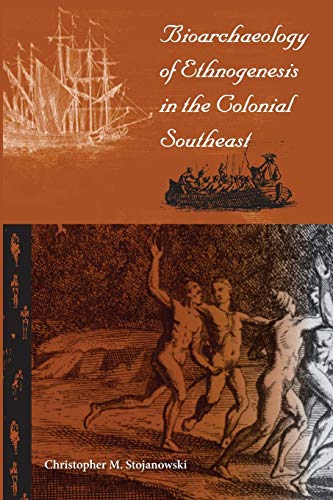All books / Book
Bioarchaeology of Ethnogenesis in the Colonial Southeast (Florida Museum of Natural History: Ripley P. Bullen Series)

| Full title: | Bioarchaeology of Ethnogenesis in the Colonial Southeast (Florida Museum of Natural History: Ripley P. Bullen Series) |
|---|---|
| ISBN: | 9780813049038 |
| ISBN 10: | 0813049032 |
| Authors: | |
| Publisher: | University Press Of Florida |
| Edition: | Paper edition |
| Num. pages: | 266 |
| Binding: | Paperback |
| Language: | en |
| Published on: | 2013 |
Read the reviews and/or buy it on Amazon.com
Synopsis
"Stojanowski compellingly situates biological distance research as central to the ethnohistorical and anthropological study of Native American and colonial history in the Southeastern United States. The intricate discussion of his statistical methodology--especially his acute and appropriate attention to the microevolutionary basis of his analyses and results--will very much be a must-read for all bioarchaeologists."--Ann M. Kakaliouras, Whittier College
"This artful combination of dental, archaeological, and historical information contributes much to our understanding of the peoples of the early historic Southeast. It will be of special interest to researchers grappling with how best to employ skeletal remains in the study of ethnogenesis."--George Milner, Pennsylvania State University
Christopher Stojanowski seeks to understand changes in social identities among Christianized Native Americans living within Franciscan missions during the Spanish colonial period. His novel contribution is attempting to reconstruct identity transformation through skeletal analysis within a microevolutionary framework.
Key to this narrative is a detailed, contextual analysis of data gathered from mission cemetery remains of Apalachee, Timucua, and Guale individuals interpreted within broad historical trends and social theoretical constructions of ethnicity and ethnogenesis. Stojanowski's investigation of biological data gathered from these earlier groups may help scientists trace the ethnogenesis of the present-day Seminole tribe in Florida.
Analyses suggest the native communities throughout northern Florida and coastal Georgia were developing a common social identity by the end of the seventeenth century--a fact that allows for reinterpretation of eighteenth-century ideas about Seminole origins. In this intriguing and controversial investigation, Stojanowski strives to bridge the divide between the social world of humans and the biological aspects of our lives by linking patterns of past skeletal variation to patterns of group affinity and identification.
Christopher M. Stojanowski is a bioarchaeologist affiliated with the Center for Bioarchaeological Research at Arizona State University's School of Human Evolution and Social Change. He is the author of Biocultural Histories in La Florida and coeditor of Bioarchaeology and Identity in the Americas.